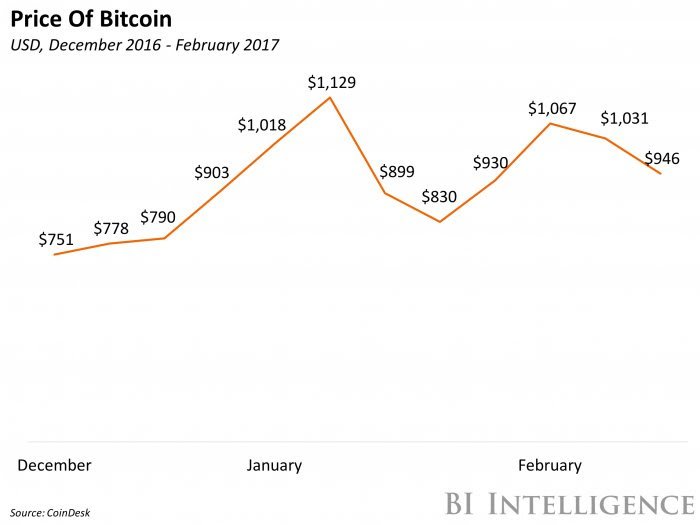This story was delivered to BI Intelligence “Fintech Briefing” subscribers. To learn more and subscribe, please click here.
The People’s Bank of China (PBOC) has been hounding domestic bitcoin exchanges for some time now, pressuring them to ensure compliance with existing financial regulations and issuing warnings about the risks of bitcoin trading.
In fact, just this week, the PBOC held a closed-door meeting with several then-unnamed exchanges to discuss its concerns. This increased scrutiny has prompted some exchanges to take measures to preempt a feared regulatory crackdown.
Now, two new developments have emerged in this ongoing saga:
- The PBOC revealed the details of its private meeting. In a statement on its website on Thursday, the PBOC said the meeting had been with nine of the country’s smaller bitcoin exchanges, and released their names, Reuters reports. The PBOC said the parties discussed risks and issues in the domestic bitcoin market, and that it warned the exchanges that they face closure if they violate regulations by engaging in money laundering and margin lending. After the meeting, a number of the exchanges followed the example set by larger competitors last week, and introduced fees, according to CoinDesk.
- OKCoin and Huobi suspended cryptocurrency withdrawals on their exchanges. Also on Thursday, the major exchanges released statements announcing that they would suspend bitcoin and Litecoin withdrawals on their exchanges for a month, Bloomberg reports. Both exchanges explained the suspension would last while they “upgraded” their systems to ensure they are compliant with anti-money laundering, foreign exchange management, and other financial rules. The announcement caused bitcoin prices to drop sharply on Thursday morning, from $1,063 at the start of the day to $946 by mid-afternoon.
These developments suggest that the PBOC is preoccupied with ensuring existing regulations are enforced. The PBOC’s emphasis to date has been on bitcoin exchanges abiding by existing financial regulations, rather than on introducing new market-specific rules for these players. This indicates both that the exchanges may be in violation of these rules, and also that oversight of the industry has not been adequate. As such, it is perhaps likely that the next chapter in this story will be tougher penalties for transgressors, rather than the introduction of any new regulations for bitcoin exchanges.
Blockchain technology, which is best known for powering Bitcoin and other cryptocurrencies, is gaining steam among finance firms because of its potential to streamline processes and increase efficiency. The technology could cut costs by up to $20 billion annually by 2022, according to Santander.
That’s because blockchain, which operates as a distributed ledger, has the ability to allow multiple parties to transfer and store sensitive information in a space that’s secure, permanent, anonymous, and easily accessible. That could simplify paper-heavy, expensive, or logistically complicated financial systems, like remittances and cross-border transfer, shareholder management and ownership exchange, and securities trading, to name a few. And outside of finance, governments and the music industry are investigating the technology’s potential to simplify record-keeping.
As a result, venture capital firms and financial institutions alike are pouring investment into finding, developing, and testing blockchain use cases. Over 50 major financial institutions are involved with collaborative blockchain startups, have begun researching the technology in-house, or have helped fund startups with products rooted in blockchain.
Jaime Toplin, research associate for BI Intelligence, Business Insider’s premium research service, has compiled a detailed report on blockchain technology that explains how blockchain works, why it has the potential to provide a watershed moment for the financial industry, and the different ways it could be put into practice in the coming years.
Here are some key takeaways from the report:
- Spending on capital markets applications of blockchain is expected to grow at a 52% compound annual growth rate (CAGR) through 2019, according to Aite Group, to reach $400 million that year.
- Banks and major financial institutions are working both collaboratively and independently to develop blockchain tech. Over 50 major financial institutions are involved with collaborative blockchain startups, like R3 CEV or Chain. And many are investing in the technology on their own as well.
- Putting blockchain to use for real-world transactions is likely not that far off. If working groups’ tests are successful, firms could be using it to transact real value as early as the end of this year and we could see widespread industry application within the next few years.
In full, the report:
- Examines the funding increases that are pouring into blockchain
- Assesses why blockchain is becoming so popular and what factors are driving up increased research and development
- Explains in full how blockchain technology work and what assets make it valuable and vulnerable
- Identifies pain points in the financial industry and profiles how various firms are using blockchain to solve them
- Demonstrates the challenges to mainstream adoption and their potential solutions
To get your copy of this invaluable guide, choose one of these options:
- Subscribe to an ALL-ACCESS Membership with BI Intelligence and gain immediate access to this report AND over 100 other expertly researched deep-dive reports, subscriptions to all of our daily newsletters, and much more. >> START A MEMBERSHIP
- Purchase the report and download it immediately from our research store. >> BUY THE REPORT
The choice is yours. But however you decide to acquire this report, you’ve given yourself a powerful advantage in your understanding of blockchain technology.
Learn more:
- Credit Card Industry and Market
- Mobile Payment Technologies
- Mobile Payments Industry
- Mobile Payment Market, Trends and Adoption
- Credit Card Processing Industry
- List of Credit Card Processing Companies
- List of Credit Card Processing Networks
- List of Payment Gateway Providers
- M-Commerce: Mobile Shopping Trends
- E-Commerce Payment Technologies and Trends

















